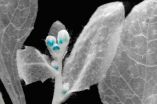(Press-News.org) Plants producing flower pollen must not leave anything to chance. The model plant thale cress (Arabidopsis), for instance, uses three signalling pathways in concert with partially overlapping functions. The yield becomes the greatest when all three processes are active; however, two are sufficient to form an acceptable quantity of flower pollen. In a new study, Peter Huijser and his colleagues at the Max Planck Institute for Plant Breeding Research in Cologne offer fascinating insights into the rich range of proteins that are used by seed plants to develop stamens and form flower pollen. The rule for plant survival is simple: to stay in the game, you have to reproduce.
Flowers are no ornamental luxury to plants; after all, they hold the male and female reproductive organs. The male pollen is produced in the stamens and the carpel bears the female ovule. The fusion of the two produces a germinable embryo that ensures the reproduction of the plant. Plants can only bloom if a radical transition occurs during their development. This stops the production of leaves and instead causes the reproductive cells that are equipped with a single set of chromosomes to form sexually distinctive reproductive organs. For optimal reproduction, this must coincide with certain external conditions, such as light and temperature. However, sensitivity to the external conditions must not be so great that it prevents blooming if the environmental conditions are not optimal.
One of the three signalling pathways that are used to develop male reproductive organs and cells cannot be substituted. This signalling pathway via the SPOROCYTELESS gene, which has been known for a long time, is activated as soon as the so-called AGAMOUS protein indicates which cells at the end of the axis of the shoot should form the stamens. Peter Huijser and his colleagues at the Max Planck Institute for Plant Breeding Research have now shown that functional male reproductive organs and cells only develop if at least one of two further signalling pathways is involved. Together with the central, indispensable signalling pathway, they ensure that not only is the formation of pollen initiated, but also that the right tissue and anatomical structures are developed for the development, maturation and release of the pollen grains. If the central signalling pathway mutates, the flowers become sterile.
Huijser and his colleagues have focussed in particular on investigating mutations in the two other signalling pathways. These lead to highly interesting differences in the plant's fertility during early and late inflorescence. One pathway uses the so-called SPL8 protein; the other uses several proteins that are related to SPL8. The latter is mainly distinguished from SPL8 by the fact that it can be repressed using a short ribonucleid acid, the so-called micro-RNA156. Huijser explains: "If, due to a mutation, the SPL8 pathway is eliminated, the plant becomes less fertile. However, the alternative signalling pathway ensures that enough mature pollen grains are produced to guarantee the survival of the species, with one important exception: the first flowers of a plant with SPL8 mutation are fully sterile. We think that, in the early floral phase, the second signalling pathway is blocked by a concentration of micro-RNA156 which, at that point, is still too high."
This conclusion from the scientists in Cologne ties in with an observation by Detlef Weigel and his colleagues at the Max Planck Institute for Developmental Biology in Tübingen. Weigel has previously shown that a high concentration of micro-RNA156 during the vegetative growth phase blocks one of the two alternative signalling pathways in that phase. The older the plant becomes, the less micro-RNA156 is formed, and thus its effect on the signalling pathway is reduced. When the first flowers form, the effect is still stronger.
Huijser concludes: "The first flowers are fertile thanks to the two other signalling pathways, that is, SPOROCYTELESS and SPL8. Without SPL8, the thale cress cannot produce mature pollen grains in the first flowers. It is not until a later floral stage that the flowers become fertile: once the retarding effect of micro-RNA156 has completely subsided and the other signalling pathway has been triggered. This also explains why the three signalling pathways together make for the best result in pollen grain production. However, two are sufficient to ensure plant fertility."
INFORMATION:
Original publication
Shuping Xing, María Salinas, Susanne Höhmann, Rita Berndtgen, and Peter Huijser
miR156-Targeted and Nontargeted SBP-Box Transcription Factors Act in Concert to Secure Male Fertility in Arabidopsis
The Plant Cell 10.1105/tpc.110.079343 (advance online publication; open access article)
The production of plant pollen is regulated by several signaling pathways
2011-01-27
ELSE PRESS RELEASES FROM THIS DATE:
Support not punishment is the key to tackling substance abuse and addiction among nurses
2011-01-27
As many as ten to 20 per cent of nurses and nursing students may have substance abuse and addiction problems, but the key to tackling this difficult issue - and protecting public safety - is support and treatment, not punishment. That is the key message in a paper in the February issue of the Journal of Clinical Nursing.
Researchers have recommended six key points that could be built into alternative-to-dismissal (ATD) strategies after reviewing the latest research and professional guidance from countries such as the USA, Canada, New Zealand, Australia and the UK.
They ...
The water temperature in the subtropical Atlantic falls due to wind action
2011-01-27
The temperature of water situated in the subtropical Atlantic experienced a drop of 0.15ºC between 1998 and 2006. This has been revealed by a study led by the IEO (Spanish Oceanography Institute) which suggests that circulation caused by wind could be responsible for this "unusual" behaviour.
Whilst the water temperature in this area, situated along the 24.5º north parallel, from the African coast to the Caribbean, rose by 0.27ºC between 1957 and 1998, researchers have recorded a drop of 0.15ºC in the same area between 1998 and 2006.
"In the ocean there are very ...
'Difficult' patients more likely to experience worse symptoms
2011-01-27
'Difficult' patient-clinician encounters have a negative impact on patients' health outcomes in the short-term, according to a new study by Sheri Hinchey from the Tripler Army Medical Centre in Honolulu and Jeffrey Jackson from the Zablocki VA Medical Centre in Milwaukee. Their findings1 show that nearly 18 percent of patients are perceived as difficult by their physicians and are less likely to trust or be satisfied with their doctor. Importantly, these patients are also more likely to report worse symptoms two weeks after the consultation. Hinchey and Jackson's work has ...
MDC researchers and clinicians identify mediator of blood pressure regulation in the liver
2011-01-27
For 60 years, scientists have puzzled over the possibility of a hepatic osmoreceptor that influences blood pressure regulation. Now, researchers of the Max Delbrück Center for Molecular Medicine (MDC) Berlin-Buch, the Experimental and Clinical Research Center (ECRC) of the MDC and Charité and the Hannover Medical School (MHH) appear to have made a breakthrough discovery. Dr. Stefan Lechner and Professor Gary R. Lewin (both of MDC), Professor Friedrich C. Luft (ECRC) and Professor Jens Jordan (ECRC; now MHH) have discovered a new group of sensory neurons in the mouse liver ...
Infiltrating cancer's recruitment center
2011-01-27
Tel Aviv — The most common connective tissue cell in animals is the fibroblast, which plays an important role in healing wounds. But Dr. Neta Erez of Tel Aviv University's Sackler Faculty of Medicine has now demonstrated that fibroblasts can also do a body great harm, helping to "recruit" immune cells for tumor growth.
At the onset of a tumor's creation when cancer cell proliferation is beginning, fibroblasts rush to the scene to aid in healing. However, Dr. Erez's research shows that these ordinarily helpful cells can actually be turned against the body, enhancing ...
Hardware, software advances help protect operating systems from attack
2011-01-27
The operating system (OS) is the backbone of your computer. If the OS is compromised, attackers can take over your computer – or crash it. Now researchers at North Carolina State University have developed an efficient system that utilizes hardware and software to restore an OS if it is attacked.
At issue are security attacks in which an outside party successfully compromises one computer application (such as a Web browser) and then uses that application to gain access to the OS. For example, the compromised application could submit a "system call" to the OS, effectively ...
Growth-factor-containing nanoparticles accelerate healing of chronic wounds
2011-01-27
Massachusetts General Hospital (MGH) investigators have developed a novel system for delivery of growth factors to chronic wounds such as pressure sores and diabetic foot ulcers. In their work published in the Jan. 18 Proceedings of the National Academy of Sciences, the team from the MGH Center for Engineering in Medicine (CEM) reports fabricating nanospheres containing keratinocyte growth factor (KGF), a protein known to play an important role in wound healing, fused with elastin-like peptides. When suspended in a fibrin gel, these nanoparticles improved the healing of ...
Fishy consequences of transplanting trout, salmon, whitefishes
2011-01-27
This press release is available in French.
Montreal, January 26, 2011 – Not all trout are created equal. Those swimming up the streams of British Columbia might resemble their cousins from Quebec, yet their genetic makeup is regionally affected and has an impact on how they reproduce, grow and react to environmental stressors.
Such regional variance makes transplanting fish species – to bolster dwindling populations – tricky business. These are some of the findings of a compelling review published in Heredity, a journal from the Nature Publishing Group, which examined ...
UNH research recommends new regulatory structure to mitigate financial risk in China
2011-01-27
DURHAM, N.H. – New research from the University of New Hampshire suggests that China should establish a unified supervisory agency, similar to what is used in Singapore, to oversee its complex financial sector.
The new research by Honggeng Zhou, associate professor of decision sciences, and Wenjuan Xie, assistant professor of finance, both at UNH, is presented in the working paper "Challenges for the Unified Financial Supervision in the Post-crisis Era: Singaporean Experience and Chinese Practice." The paper is co-authored by Jing Geng of Harvard University and GuiBin ...
Florida State, UT researchers: Swear words less offensive on cable than broadcast TV
2011-01-27
KNOXVILLE -- Four letter words may offend you more depending on which television channel you watch, according to a recent study out of Florida State University and the University of Tennessee, Knoxville.
This study, published in the January issue of Mass Communication and Society, found that some TV viewers believe swearing on premium channels and cable is less offensive than vulgarity on broadcast channels. Similarly, viewers are more tolerant of swearing on the premium channels than they are on the advertiser supported cable channels. This differs from previous research, ...




